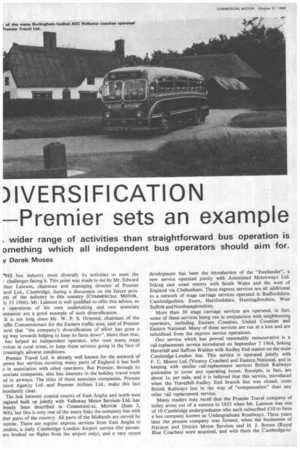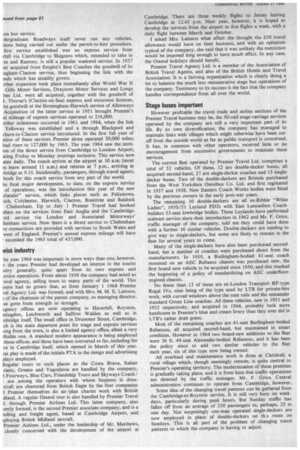)IVERSIFICATION Premier sets an example
Page 62

Page 64

If you've noticed an error in this article please click here to report it so we can fix it.
wider range of activities than straightforward bus operation is omething which all independent bus operators should aim for.
y Derek Moses
HE bus industry must diversify its activities to meet the challenges facing it. This point was made to me by Mr. Edward -thur Lainson, chairman and managing director of Premier avel Ltd., Cambridge, during a discussion on the future proscts of the industry in this country (COMMERCIAL MOTOR, ly 15 1966). Mr. Lainson is well qualified to offer this advice, as e operations of his own undertaking and two associate impanies are a good example of such diversification.
It is not long since Mr. W. P. S. Ormond, chairman of the -affic Commissioners for the Eastern traffic area, said of Premier -avel that "the company's diversification of effort has gone a rig way towards helping to keep its fares down". More than that, has helped an independent operator, who runs many stage xvices in rural areas, to keep these services going in the face of creasingly adverse conditions.
Premier Travel Ltd. is already well known for the network Of [press bus services covering many parts of England it has built D in association with other operators. But Premier, through its isociate companies, also has interests in the holiday travel trade ld in airways. The titles of these associate companies, Premier ravel Agency Ltd. and Premier Airlines Ltd., make this fact bundantly clear.
The link between coastal resorts of East Anglia and north-west :ngland built up jointly with Yelloway Motor Services Ltd. has lready been described in COMMERICAL MOTOR (June 3, 966), but this is only one of the many links the company has with ther parts of the country. All parts of the Midlands are served by remier. There are regular express services from East Anglia to ,ondon, a daily Cambridge—London Airport service (for passeners booked on flights from the airport only), and a very recent development has been the introduction of the "Eastlander", a new service operated jointly with Associated Motorways Ltd. linking east coast resorts with South Wales and the west of England via Cheltenham. These express services are all additional to a network of stage carriage services operated in Bedfordshire, Cambridgeshire, Essex, Hertfordshire, Huntingdonshire, West Suffolk and Northamptonshire.
More than 30 stage carriage services are operated, in fact, some of these services being run in conjunction with neighbouring operators, including Eastern Counties, United Counties and Eastern National. Many of these services are run at a loss and are subsidized from the express service operations.
One service which has proved reasonably remunerative is a rail-replacement service introduced on September 7 1964, linking Haverhill and Saffron Walden with Audley End station on the main Cambridge-London line. This service is operated jointly with F. C. Moore Ltd. (Viceroy Coaches) and Eastern National, and in keeping with similar rail-replacement services British Railways guarantee to cover any operating losses. Receipts, in fact, are about Is. per mile, and it is believed that this service, introduced when the Haverhill-Audley End branch line was closed, costs British Railways less in the way of "compensation" than any other rail replacement service.
Many, readers may recall that the Premier Travel company of today arose out of a venture in 1933 when Mr. Lainson was one of 10 Cambridge undergraduates who each subscribed 10 to form a bus company known as Undergraduate Roadways. Three years later the present company was formed, when the businesses of Harston and District Motor Services and H. J. Brown (Royal Blue Coaches) were acquired, and with them the Cambridge-to on bus service.
dergraduate Roadways itself never ran any vehicles, tions being carried out under the permit-to-hire procedure. first service established was an express service from rhill via Cambridge to Skegness which, extended to take in 'es and Ramsey, is still a popular weekend service. In 1937 ier acquired from Empire's Best Coaches the goodwill of its ngham-Clacton service, thus beginning the link with the Inds which has steadily grown.
rther expansion took place immediately after World War II Gills Motor Services, Draytons Motor Services and Longs hes Ltd. were all acquired,, together with the goodwill of I. Thorne's (Clacton-on-Sea) express and excursion licences, he goodwill of the Birmingham-Harwich service of Allenways Acquisition of the latter service in 1951 brought Premier's al mileage of express services operated to 216,000.
trther milestones occurred in 1961 and 1964, when the link Yelloway was established and a through Blackpool and (burn-to-Clacton service introduced. In the first full year of ation of these services Premier alone operated 20,000 miles; had risen to 127,000 by 1965. The year 1964 saw the introion of the direct service from Cambridge to London Airport, ating Friday to Monday evenings inclusive. This service now ates daily. The coach arrives at the airport at 10 a.m. (most ts leave around 11 a.m.) and returns at 7 p.m., arriving in 'bridge at 9.15. Incidentally, passengers, through travel agents, book for this coach service from any part of the world.
he final major development, to date, on the express service of operations, was the introduction this year of the new itlander" service, which links places such as Felixstowe, rich, Colchester, Harwich, Clacton, Braintree and Baldock Cheltenham. Up to July 1 Premier Travel had booked ellers on the services from East Anglia and the Cambridge)rd service via London and Associated Motorways' ltenham service. Now there is a direct service to Cheltenham re connections are provided with services to South Wales and west of England. Premier's annual express mileage will have
• exceeded the 1965 total of 437,000.
Kist industry
be year 1964 was important in more ways than one, however. T the years Premier had developed an interest in the tourist istry generally, quite apart from its own express and anion operations. From about 1958 the company had acted as .avel agency, selling tours to many parts of the world. This Mess had so grown that, as from January 1 1964 Premier vel Agency Ltd. was formed, and with Mrs. M. M. E. Lainson, of the chairman of the parent company, as managing director, as gone from stretigth to strength.
kgency offices are now operating in Haverhill, Royston, ntingdon, Letchworth and Saffron Walden as well as in nbridge itself. The small office in Drummer Street, Cambridge, .ch is the main departure point for stage and express services 'ring from the town, is also a limited agency office, albeit a very .fitable one. A standard modern appearance is being employed these offices, and three have been converted so far, including the ce in Cambridge itself, which opened in March of this year. at play is made of the initials PTA in the design and advertising plays employed.
Regular tours to such places as the Costa Brava, Italian riatic, Greece and Yugoslavia are handled by the company, Fourways, Blue Cars, Friendship Tours and Skyways Coach/ are among the operators with whom business is done. -craft are chartered from British Eagle by the ibur companies Premier themselves do air /plan charter work with British dland. A regular Ostend tour is also handled by Premier Travel I. through Premier Airlines Ltd. This latter company, also :ently formed, is the second Premier associate company, and is a ndling and freight agent, based at Cambridge Airport, and tploying British Midland aircraft.
Premier Airlines Ltd., under the leadership of Mr. Matthews, closely concerned with the development of the airport at Cambridge. There are three weekly flights to Jersey leaving Cambridge at 12.45 p.m. Next year, however, it is hoped to develop the services from the airport to five flights a week, with a daily flight between March and October.
I asked Mrs. Lainson what effect she thought the £50 travel allowance would have on their business, and with an optimism typical of the company, she said that it was unlikely the restriction would be imposed long enough to have much effect. In any case, the Ostend holidays should benefit.
Premier Travel Agency Ltd. is a member of the Association of British Travel Agents, and also of the British Hotels and Travel Association. It is a thriving organization which is clearly doing a lot to balance the much less remunerative stage bus operations of the company. Testimony to its success is the fact that the company handles correspondence from all over the world.
Stage buses important
However profitable the travel trade and airline sections of the Premier Travel business may be, the 30-odd stage carriage services operated by the company are still a very important part of its life. By its own diversification, the company has managed to maintain links with villages which might otherwise have been cutoff from the outside world as far as public transport is concerned. It has, in common with other operators, received little or no encouragement from successive governments to maintain these services.
The current fleet operated by Premier Travel Ltd. comprises a total of 52 vehicles. Of these, 12 are double-decker buses, all acquired second-hand, 27 are single-decker coaches and 13 singledecker buses. Two of the double-deckers are Bristols purchased from the West Yorkshire Omnibus Co. Ltd. and first registered in 1937 and 1938. New Eastern Coach Works bodies were fitted by the previous owners in the early post-war years.
The remaining 10 double-deckers are all ex-Ribble "White Ladies", 1950/51 Leyland PD2s with East Lancashire Coachbuilders 53-seat lowbridge bodies. These Leylands have performed stalwart service since their introduction in 1962 and Mr. F. Grice, traffic manager of the company, told me they could have done with a further 10 similar vehicles. Double-deckers are tending to give way to single-deckers, but some are likely to remain in the fleet for several years to come.
Many of the single-deckers have also been purchased secondhand, but a number of coaches were purchased direct from the manufacturers. In 1959, a Burlingham-bodied 41-seat coach mounted on an AEC Reliance chassis was purchased new, the first brand new vehicle to be acquired since 1950, and this marked the beginning of a policy of standardizing on AEC underfloorengined chassis.
No fewer than 13 of these are ex-London Transport RF-type Regal IVs, nine being of the type used by LTB for private-hire work, with curved windows above the cant rails and the remainder standard Green Line coaches. All these vehicles, new in 1951 and 1952 respectively, and acquired in 1964, probably look more handsome in Premier's blue and cream livery than they ever did in LTB's rather, drab green. Most of the remaining coaches are 41-seat Burlingham-bodied Reliances, all acquired second-hand, but maintained in smart condition. However in 1964 two brand-new additions to the fleet were 36 ft. 49-seat Alexander-bodied Reliances, and it has been the policy since to add two similar vehicles to the fleet each year, six of this type now being owned.
All overhaul and maintenance work is done at Chrishall, a rural village which, though seemingly remote, is quite central to Premier's operating territory. The modernization of these premises is gradually taking place, and it is from here that traffic operations are directed by the traffic manager, Mr. F. Grice. Central administration continues to operate from Cambridge, however, Some idea of the changing travel patterns can be gathered from the Cambridge-to-Royston service. It is still very busy on weekdays, particularly during peak hours. But Sunday traffic has fallen off from an average of 250 passengers to, perhaps, 25 in one day. Not surprisingly one-man operated single-deckers are now employed in place of double-deckers on th. s route on Sundays. This is all part of the problem of changing travel patterns to which the company is having to adjust.












































































































































